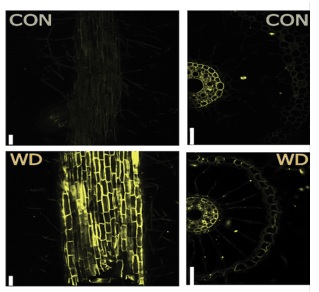Rice Suberin Regulators For Abiotic Stress Tolerance
Tech ID: 33117 / UC Case 2022-879-0
Background
Suberin is a natural, complex, carbon-rich, biopolymer typically found in the cell walls of plants. Plant cell walls form physiologically relevant interfaces between the plant and the environment, affecting water and nutrient transport and protecting plants from pathogens. Suberin is present in walls of specific internal root layers of vascular plants, playing an important role in the adaptation of plants to terrestrial life. Plants also respond to some external stimuli by modifying the amount, distribution and characteristics of suberin in their root cell walls.
Prior research has confirmed that suberin levels affect water use efficiency, mineral ion uptake, and other, important, plant-related processes. Suberin is also thought to persist in soils longer than other plant-produced biopolymers, making it a promising avenue for increasing soil carbon sequestration.
Brief Description
Professor Julia Bailey-Serres and colleagues from the University of California, Riverside have identified transcription factors involved in the synthesis and modulation of suberin in plants. These transcription factors can be gene-edited or otherwise engineered in rice or other monocot crops to alter suberin production – which can lead to development of new rice cultivars with enhanced tolerance to stresses ranging from increased soil salinity to drought to pest.

Fig 1: Fluorol Yellow (FY) staining of rice crown roots for suberin in longitudinal views of the exodermis and radial cross sections under environmental conditions of well-watered (CON) or water deficit (WD).
Advantages
- Crops with modified suberin transcription factors may enable development of crops that can withstand a range of weather extremes.
Patent Status
| Country | Type | Number | Dated | Case |
| United States Of America | Published Application | 20240093217 | 03/21/2024 | 2022-879 |
Additional Patent Pending
Related Materials
Contact
- Rekha Chawla
- rekha.chawla@ucr.edu
- tel: View Phone Number.
Other Information
Keywords
drought, flooding, roots, Oryza sativa, crops, suberin, transcription factors, abiotic stress, rice
